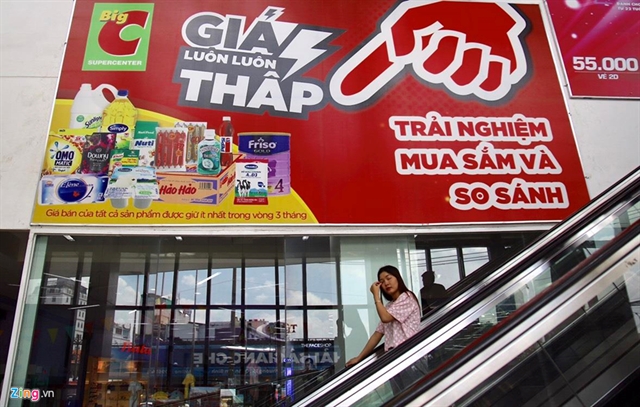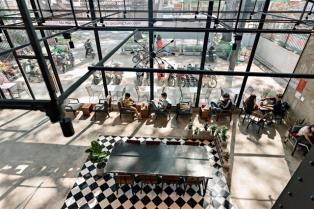Though Big C Vietnam’s decision to stop buying Vietnamese garments was discontinued immediately and it was soon business as usual, public opinion has yet to settle down, with many people worrying about the fate of Vietnamese goods in future.

Though Big C Vietnam’s decision to stop buying Vietnamese garments was discontinued immediately and it was soon business as usual, public opinion has yet to settle down, with many people worrying about the fate of Vietnamese goods in future.
Early last week Thailand’s Central Group, the owner of the supermarket chain, had sent a letter to Vietnamese vendors saying it plans to stop buying garments from this month “until further notice” to restructure the business.
The vendors protested strongly, saying Big C’s move was sudden and incomprehensible and pointing out that it had committed to continuing cooperation with suppliers when buying Big C in Vietnam from France’s Casino Group a few years ago.
A meeting was held between the Ministry of Industry and Trade, Central Group Vietnam and the ambassador of Thailand to Viet Nam.
The outcome was that Big C resumed buying from 50 of the 200 textile and garment suppliers with whom it had had contracts.
It might look like a happy ending but the story about the future of Vietnamese goods even in the domestic market seems to be just beginning.
Many analysts recalled that experts had warned about just this possibility a few years ago when a number of large local retail chains were taken over by foreign retailers.
Viet Nam saw an influx of major foreign players from countries and territories around the world starting in the early 2000s and the trend gained pace in 2015.
South Korea’s Lotte Group, which came in 2008, is expected to have 60 supermarkets by 2020.
Japan’s Aeonmall entered in 2009 with its first supermarket in HCM City’s Tan Phu District, and hopes to expand to 20 outlets by next year.
Japanese - American 7- Eleven wants to increase the number of its convenience stores to 1,000 by next year.
Viet Nam has allowed fully-owned foreign retail businesses under certain conditions since 2009, two years after becoming a member of the World Trade Organisation (WTO).
Under its WTO commitments, in 2016 the country lowered barriers to opening stores of less 500 square metres, and foreign convenience stores chains have flourished since then.
A report recently released by Vietcombank Securities said the mini super and convenience stores market would be the fastest growing model this year. Though it only accounts yet for a small proportion of the retail market revenues, it has been growing rapidly, attracting international brands such as Family Mart, Circe K, Shop & Go, Ms Mart and GS25.
Analysts say though Viet Nam has put up technical barriers to protect domestic retailers, including the imposition of ENT (economic needs test) permitted by the WTO before allowing foreign retailers to open their second and subsequent outlets in Viet Nam, these restrictions are not effective when foreign investors acquire local players or set up joint ventures with them.
In theory, ENT is an instrument for Viet Nam to control the foreign retail network expansion and protect Vietnamese retailers.
It gives authorities the right to refuse licences for foreign retailers to open second and subsequent outlets if ENT shows there is no need for more outlets in a certain locality.
Central Group for example, after M&A deals with Big C and Metro Cash & Carry, has 51 stores, including 32 of the former.
However, under the Comprehensive and Progressive Agreement for Trans-Pacific Partnership signed last year, the two retailers will be able to expand without any further government screening.
In the domestic apparel industry, experts said that in seven years when all tariff barriers for garments among the CPTPP countries have been completely removed, foreign apparel firms all have the ambition to dominate the Vietnamese retail market which is valued at US$4.5 billion per year and with annual growth of 20 per cent.
Influence and solutions
Several years ago experts warned about the possibility that Vietnamese products could lose their market right at home because of the rapid decline in domestic retail chains and the increasing dominance of foreign retailers.
It was predicated on two factors: the symbiotic relationship between the producers and domestic retailers and the very high cost of setting up their own distribution systems if the now-dominant foreign retailers do not buy from them.
To help domestic retailers develop, experts suggested that the Government should have policies and mechanisms to support them in terms of taxation, technology adoption, access to low-cost capital, and administrative procedures to help reduce business costs.
According to an official at the Ha Noi Investment Promotion, Trade and Tourism Centre, it is difficult for Vietnamese producers to access information about criteria for production and technology to make quality products that meet market demand, are competitive and have reasonable prices.
The consequence is that the volume of Vietnamese products on display at supermarkets and malls, especially foreign-owned, is quite small compared to the country’s production capacity.
It is estimated that only one in 10 Vietnamese businesses are capable of getting their goods on the shelves of foreign-owned supermarkets considering the squeeze on prices and discounts to be given.
And when they are unable to make it to the shelves of big supermarkets like Big C and MM Mega Market, not only their revenue but also their brand value is hit since visibility at large malls translates into prestige that traditional retail channels can never bestow on them.
But retailers are all-powerful, meaning suppliers must find ways to make the market depend on them too.
That brings the issue back to offering high quality and competitive prices, experts say.
Considering their weakness in this regard, they say enterprises should closely co-operate with each other to overcome factors like limited resources, poor management skills and lack of experience in doing business in a market economy.
For the Government, experts say Viet Nam is struggling for a sharing economy and a fair-trade foundation in the domestic market.
Besides, the Government should have specific regulations and criteria for authorised agencies to enable them to actively participate in negotiations for international conventions to protect Vietnamese producers who aspire to improve the competitiveness of Vietnamese goods, making them dominate the market. — VNS





